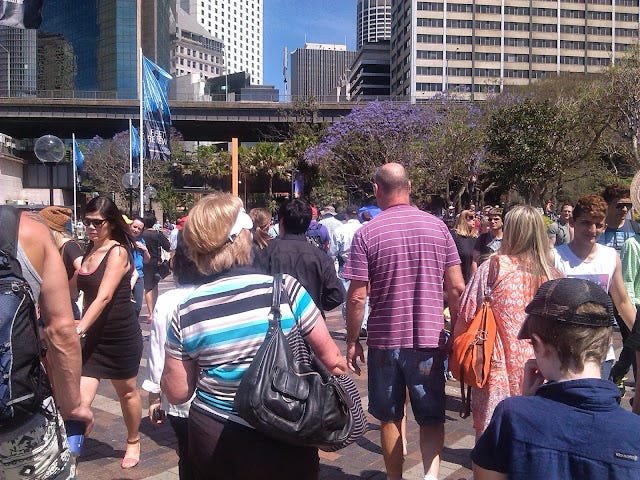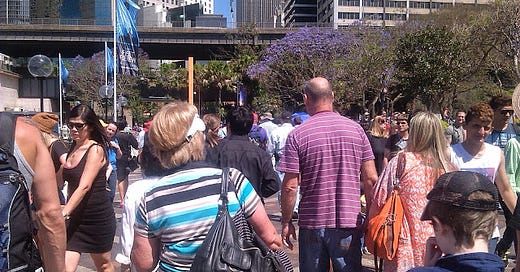
Circular Quay, Sydney, October 5, 2014
There were so many people in town. He wasn't one of them. He had lost all claim to humanity long ago. Apart from his daughter and the mother of his children, forging ahead through the crowds, he recognised no one. It wasn't the first time he had drowned in crowds, but this was daytime, the fleet was one, 8,000 sailors were in town, and all, all of them wanted to party. The streams of energy, or perhaps it was destiny itself, had already left them. Suzy had just squatted a four floor terrace in Miller's Point, right on Sydney Harbour, and was trying to get her family to come in on it. They hadn't been family for a very long time, since the kids were young and she had just been mildly delinquent, not hell on legs.
It was the best part of town. He had always wanted to live there. But not this way, not with her. The insanity had folded in on itself over the years, so that what had once been difficult was now just impossible. They were screaching and calling at each other like deranged parrots, even here where the crowds were beginning to assemble in force, preparing for the night ahead, "the biggest night of celebrations ever seen on Sydney Harbour". Well that as might be. He tried to find something to warm him in the gathering crowd, and could only think, it wasn't the first time he had seen a million people gather around the harbour foreshore; and perhaps, was it really worth the crush, for fireworks, for moments of happiness. For, this time around, one of the most beautiful light and fireworks displays ever seen on the harbour.
For the hundredth anniversary of the Australian fleet's first entry into Sydney Harbour.
For a moment to coordinate and come together. The previous night Irish sailors had stamped and shouted in the pub; if they had been locals they would have been asked to leave. The silence of some restrained middle class decorum had enveloped the entire country. No one dared make a noise, or celebrate anything. That might be thought inconsiderate. There was little in the way of alterantives. Every day lived was one less day. He could see them swerling like some dark force. Up there. Out there. Her demonic cackle. "Will it work, dad?" the kids asked, even though they were young adults now.
Would it work, squatting a four bedroom house with balconies overlooking the harbour, views across to Lavendar Bay, where Brett Whitely had once lived. To the ferris wheel and Lunar Park. "The worse that can happen is the Housing Department will send around someone to rehouse her," he said. A month later, the Department had come, and threatened her with the police. She capitulated immediately, moving out. It wasn't like her, to give in so quicly, to be afraid of the cops, and Shawnie speculated that she must have warrants out against her. Once upon a time Shawnie had been a bright young union lawyer, now she was fat, ailing and depressed. She could barely speak. "I've got nodules on my throat," she explained, declaring it was too much alcohol and too many cigarettes; and the doctor had warned her to stop or it would kill her. "Well maybe you should."
"Can't come soon enough," she declared. So bitter. So sick of life. So lazy.
Well, life takes many forms, many paths. "Can't come soon enough." He was more the opposite. As in, "we're a shortlived species. Make the most of it. We'll be dead soon enough"
THE BIGGER STORY:
As Labor’s recent period of extraordinary internal harmony shatters, former cabinet minister Nicola Roxon has excoriated Kevin Rudd, forensically detailing his bad behaviour and declaring he should leave parliament for Labor’s good.
Delivering the John Button lecture, Roxon said that removing Rudd in 2010 “was an act of political bastardry, for sure. But this act of political bastardry was made possible only because Kevin had been such a bastard himself to many people already”.
His colleagues had “got overcome by politeness” and thought it would save him pain to move quickly and say as little as possible, but this “polite white lie” turned to poison. “It was something that Julia Gillard wore as a heavy chain around her neck for her entire prime ministership,” said Roxon, a former health minister and former attorney-general who quit parliament at the election.
“In the absence of a more accurate explanation, Julia was painted as a treacherous deputy, although it was unfair and way off the mark,” she said.
“If Kevin was an employee … he would have won his unfair dismissal case, not because there wasn’t cause to dismiss him but because we didn’t explain the reasons properly to him, let alone to the voting public.”
Roxon warned that the “bitter truth” was that as long as Rudd remained in parliament, “irrespective of how he behaves, pollsters will run comparisons with him and any other leader.
“For the good of the federal parliamentary Labor party and the movement as a whole, Kevin Rudd should leave the parliament, otherwise the actions of any Labor leader will always be viewed through the prism of popularity compared to him.”
Rudd has also come under criticism from Maxine McKew in her just released update of her book Tales from the Political Trenches.
McKew, who beat John Howard in his seat in 2007 but lost in 2010, was close to Rudd. But she writes he was off his game in the 2010 election and had created confusion around his own persona.
While the leadership ballot, which elected Bill Shorten, kept the ALP together and in good spirits, this week has been marked by infighting over the frontbench, a bitter outbursdt from former speaker Anna Burke about the influence of the “faceless men”, and the obvious fact that the factions are still having massive influence, which has stopped as much new blood coming into Labor’s front line as would have been desirable.
Roxon, who criticised Rudd at the time of the 2012 challenge, in tonight’s speech painted him as appalling to other people, a treacherous leaker and stalker of Gillard, unable to deliver on commitments and with a shambolic method of governing. She documented his behaviour in an address framed around “practical tips” for the next Labor government and ALP MPs on how to conduct themselves.
She recounted that when Rudd was barnstorming the country visiting hospitals, on one occasion “over 20 hotel rooms had to be paid for, as the hospital we were scheduled to visit the next day was changed en route in the PM’s plane” and it was too late to cancel the booking.
Several times she, Gillard, treasurer Wayne Swan and senior staff were as told on Friday or Saturday to be at The Lodge on Sunday.
“On one occasion staff spent the whole day on the lawn playing handball, not allowed in but not allowed to go home and rest or be with their partners or family. More than one relationship was destroyed by this relentless disorganisation.”
In 2007 “Kevin was great at the cut through and then struggled at the follow through. In contrast, Julia was brilliantly thorough at delivering but couldn’t always deliver the message.
“Kevin had a fatal attraction to everyone else’s problems. He never saw a problem that he didn’t believe he should try and fix.” Two examples were his interfering and demanding approach to the Fukushima nuclear plant disaster and the Victorian bushfires. “Neither of these were situations where the Commonwealth could have much of a direct role and these excessive meetings called by Kevin in the middle of a crisis took up valuable time of the frontline officials.”
Rudd had “a terrible habit of attending meetings not having read detailed papers that he had commissioned at the last meeting, often very complex ones at short notice.
“I remember one meeting only days before Christmas in 2009 when a total rewrite of health policy was demanded before Christmas. Despite many hours of work into the night, I do not believe that paper was ever to this day read by the PM, let alone over a Christmas holiday he had already ruined for others.”
Roxon said that some issues seemed to run for months, even years without them able to be brought to a head. There was no avenue for ministers to bring legitimately tricky issues to cabinet for real discussion.
“Kevin as PM simply refused to list contentious and often strategic items for cabinet.” She admitted she and other ministers should have insisted on bringing on those discussions.
Rudd had “an overwhelming inclination to focus on the minutiae as a way of avoiding the big, harder decisions”.
Roxon said the outcome from the Copenhagen climate change conference could have been prepared for differently if Rudd had allowed then climate change minister Penny Wong to bring a proper discussion to the full cabinet.
“In addition to the lack of cabinet engagement on some big strategic calls, cabinet was misused by being asked to deal in enormous detail with material it could never hope to be fully across.”
Roxon said that because of Labor’s leadership tension since 2010 “and the relentless stalking of Julia by Kevin’s supporters” every substantive policy issue or decision was viewed through the unhelpful prism of personality or leadership. The leakers and those playing kamikaze politics used issues day in and day out “to keep the leadership issue burning”.
Even if one accepted that the method of Rudd’s removal was unfair “nothing excuses persistently destabilising and leaking against your own team during an election or as a senior minister or as a backbencher.
“I don’t think anyone can any longer be in doubt about how trenchantly and continuously this occurred at both Kevin’s hand and his supporters.”
“Although his removal was dramatic and brutal, it was his refusal to recover with dignity, to rise above the treatment he was meted out … that in my view showed his true nature.”
Urging in one of her tips the need to be polite and “keep yourself nice”, Roxon recalled TV footage of Rudd ignoring the then NSW premier Kristina Keneally during the health negotiations, which had given NSW the upper hand for the first time. “Disparagingly calling her Bambi behind closed doors was silly when in fact she was whip smart and went on to run rings around us.”
She said the Garden Island announcement in the 2013 campaign – when Rudd disparaged NSW premier Barry O'Farrell – “underscored this lesson hadn’t been learned”.
Rudd had always treated her respectfully, Roxon conceded. “Although I was frustrated beyond belief by his disorganisation and lack of strategy, I was never personally a vitim of his vicious tongue or temper. I did however see how terribly he treated some brilliant staff and public servants.”
Roxon said Labor had become risk averse, trying to avoid ballots rather than recognising “it is good to have a go and you will win some and lose some”. She said local members should be given more autonomy to raise and campaign on issues for their community.
From The Conversation.



